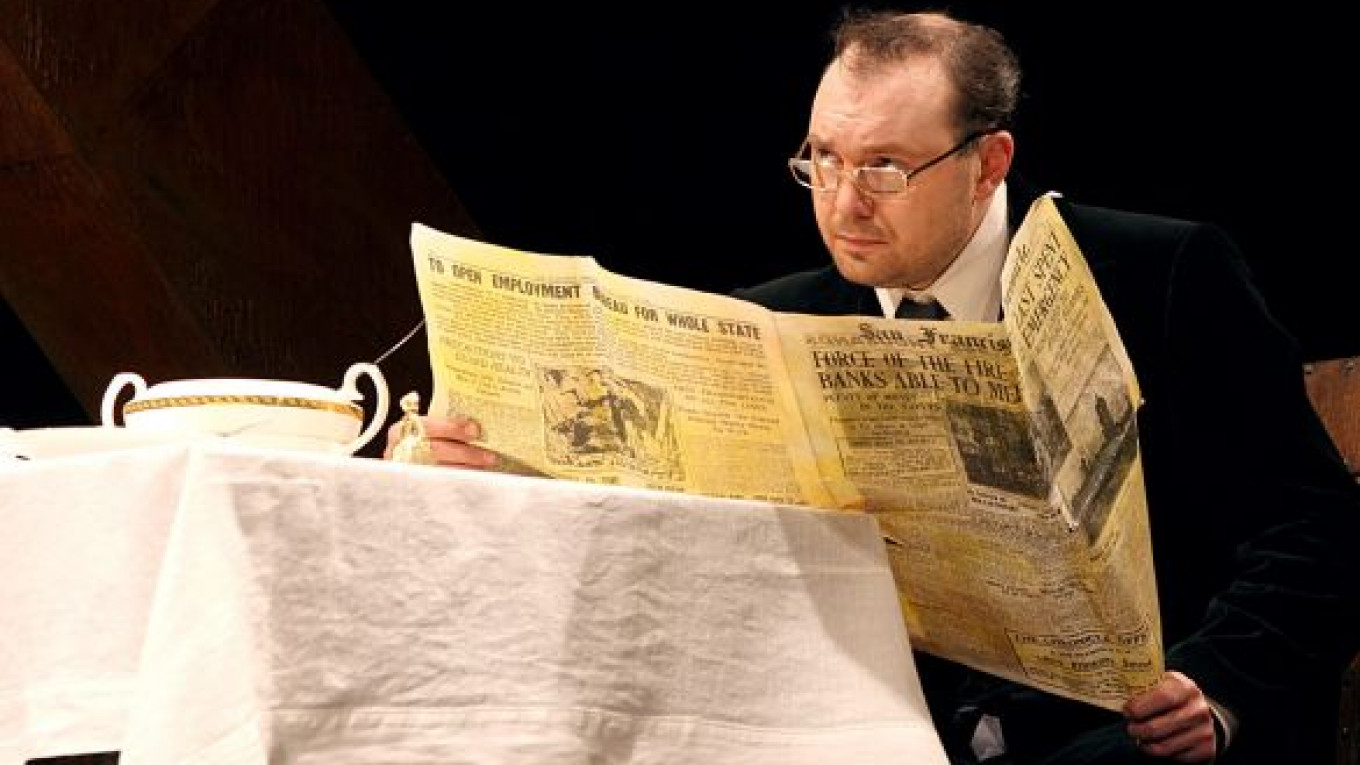One of the many things Alexei Borodin has done right of late at his National Youth Theater is to entice Mindaugas Karbauskis back into a director’s chair.
After an extended hiatus, Karbauskis turned out one of last season’s best productions in “A Stalemate Lasts But a Moment.” That marked Karbauskis’ debut at the National Youth Theater. From 2001 to 2007 this award-winning director who studied under Pyotr Fomenko had worked exclusively at the Tabakov Theater and the Chekhov Moscow Art Theater.
Following his break with the Tabakov, Karbauskis entertained several offers in various countries, but never found a project worth bringing to conclusion.
It is easy to see what attracted Karbauskis to the National Youth Theater.
Artistic director Borodin has slowly but surely built this venue into one of the city’s strongest and most interesting. His large projects with popular writers such as Boris Akunin and Tom Stoppard have grabbed public attention, but more important is that Borodin has assembled an accomplished company of actors. It is fast becoming an ideal ensemble, one consisting of varied and unique individuals who work seamlessly as a team.
This is evident again in Karbauskis’ newest production, a dramatization of “Buddenbrooks,” Thomas Mann’s first novel depicting the decline of a once-powerful family.
Karbauskis pared the large novel down to nine characters, but centered his show on three Buddenbrook children: Toni (Darya Semyonova), Thomas (Ilya Isayev) and Christian (Viktor Panchenko).
Mann was relatively schematic in his depiction of the siblings. Toni might be described as being excessively impulsive; Christian is a wastrel; and Thomas, who shoulders the task of trying to keep the family fortune intact, is prone to authoritarianism.
Under Karbauskis’ direction there is a shift toward a female point of view, and it begins with Semyonova’s performance of Toni.
Toni initially comes across as a smart, energetic, rebellious young woman who finds life too small to contain her dreams. What she doesn’t understand, however, is the power of the expectations put on her by family and society.
Rejecting the proposal of a sycophantic man named Grunlich (Dmitry Krivoshchapov) while she still possesses the insolence of youth, she eventually succumbs to the pressure of her father (Andrei Bazhin) and agrees to be the man’s wife.
It is a fateful decision, a crack in her will, which will haunt her and the family for years to come. The more Semyonova’s Toni relinquishes her independence, no matter how small the capitulations, the darker are the clouds that form over the household.
Most of the first act is given over to observing Toni’s slow, painful slide into dependence and irrelevance. Act 2 switches the focus to Thomas and his attempt to right the family’s fortunes.
However, his marriage to a cold, detached wife (Oxana Sankova) and the sickly nature of his son Hanno (Andrei Dobrzhinsky) indicate clearly that his efforts will be in vain.
Semyonova and Isayev bring full-blooded, paradoxical performances to their characters. Representing opposite forces in a family dynamic, Toni and Thomas end up in similar states of helplessness and ineffectuality.
Toni is further reduced to being the chronicler of decline as she assiduously jots down deaths in the family record — her father, her mother and then her young nephew Hanno.
The strength of this production’s female point of view is reinforced by performances by Larisa Grebenshchikova as the mother and Tatyana Matyukhova as the family maid.
Grebenshchikova shines in her final scenes as she struggles to maintain her humanity in the face of Thomas’ increasingly despotic acts. The ever-present Matyukhova is reminiscent of a natural life force in surroundings dominated by decline and death.
Karbauskis shaped this hard, harsh story with pristine clarity. Every move, every shift in lighting (designed by Sergei Skornetsky), every prop introduced into the action, has a tangible, definite reason for being.
The use of a simple book, as a symbol of the weight of tradition, almost becomes a leitmotif in the course of the performance. And that cigarette and brief dance that the father allows himself before dying is about as whimsical and sad as can be.
The spectacular set by Sergei Barkhin echoes a high-arched Protestant church, with each layer of arches taking a different course across the stage. On one side are the church pews, to which the family retreats in perilous moments; on the other is the table around which daily life is led.
“Buddenbrooks” is very much a piece of literary theater, but, as realized by Karbauskis, it is a page-turner.
“Buddenbrooks” plays March 5 and 20 at 7 p.m. at the National Youth Theater, located at 2 Teatralnaya Ploshchad. Metro Teatralnaya. Tel. 692-0069, www.ramt.ru. Running time: 3 hours, 30 minutes.
A Message from The Moscow Times:
Dear readers,
We are facing unprecedented challenges. Russia's Prosecutor General's Office has designated The Moscow Times as an "undesirable" organization, criminalizing our work and putting our staff at risk of prosecution. This follows our earlier unjust labeling as a "foreign agent."
These actions are direct attempts to silence independent journalism in Russia. The authorities claim our work "discredits the decisions of the Russian leadership." We see things differently: we strive to provide accurate, unbiased reporting on Russia.
We, the journalists of The Moscow Times, refuse to be silenced. But to continue our work, we need your help.
Your support, no matter how small, makes a world of difference. If you can, please support us monthly starting from just $2. It's quick to set up, and every contribution makes a significant impact.
By supporting The Moscow Times, you're defending open, independent journalism in the face of repression. Thank you for standing with us.
Remind me later.







